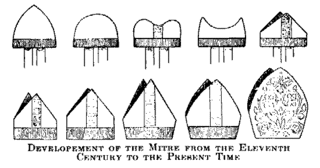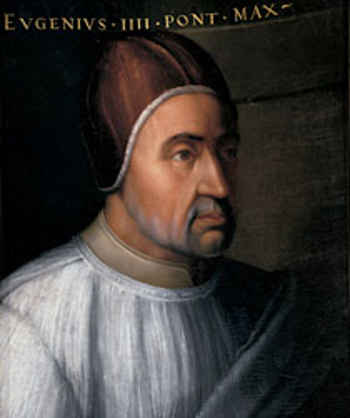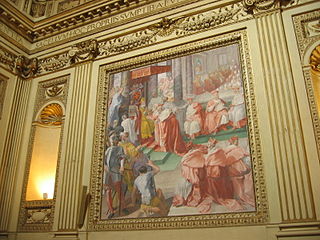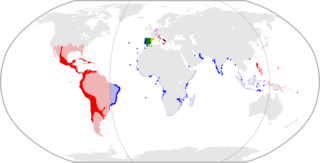
The Council of Constance was a 15th-century ecumenical council recognized by the Catholic Church, held from 1414 to 1418 in the Bishopric of Constance in present-day Germany. The council ended the Western Schism by deposing or accepting the resignation of the remaining papal claimants and by electing Pope Martin V.

An episcopal polity is a hierarchical form of church governance in which the chief local authorities are called bishops. It is the structure used by many of the major Christian Churches and denominations, such as the Catholic, Eastern Orthodox, Oriental Orthodox, Church of the East, Anglican, and Lutheran churches or denominations, and other churches founded independently from these lineages.
Presbyterorum ordinis, subtitled the "Decree on the Ministry and Life of Priests", is one of the documents produced by the Second Vatican Council. On 7 December 1965, the document was promulgated by Pope Paul VI, after an approval vote of 2,390 to 4 among the assembled bishops. The title means "Order of Priests" in Latin. As is customary for such documents in the Catholic Church, it is taken from the first line of the decree.
Orientalium Ecclesiarum is the Second Vatican Council's Decree on the Eastern Catholic Churches. One of the shortest conciliar documents, it was approved by a vote of 2,110 to 39 and promulgated by Pope Paul VI on November 21, 1964. "Orientalium Ecclesiarum" is Latin for "of [the] Eastern Churches," and is taken from the first line of the decree, as is customary with Roman Catholic official documents. The decree recognizes the right of Eastern Catholics to keep their own distinct liturgical practices while remaining in full communion with the Holy See. The decree exhorts Eastern Catholics to "take steps to return to their ancestral traditions." This aspect of the decree was directed against Latinisation.

Pope Eugene IV, born Gabriele Condulmer, was head of the Catholic Church and ruler of the Papal States from 3 March 1431 to his death. Condulmer was a Venetian, and a nephew of Pope Gregory XII. In 1431, he was elected pope. His tenure was marked by conflict first with the Colonnas, relatives of his predecessor Martin V, and later with the Conciliar movement. In 1434, due to a complaint by Fernando Calvetos, bishop of the Canary Islands, Eugene IV issued the bull "Creator Omnium", rescinding any recognition of Portugal's right to conquer those islands, still pagan. He excommunicated anyone who enslaved newly converted Christians, the penalty to stand until the captives were restored to their liberty and possessions. In 1443 Eugene decided to take a neutral position on territorial disputes between Portugal and Castile regarding rights claimed along the coast of Africa.
Conciliarism was a reform movement in the 14th-, 15th- and 16th-century Catholic Church which held that supreme authority in the Church resided with an Ecumenical council, apart from, or even against, the pope. The movement emerged in response to the Western Schism between rival popes in Rome and Avignon. The schism inspired the summoning of the Council of Pisa (1409), which failed to end the schism, and the Council of Constance (1414–1418), which succeeded and proclaimed its own superiority over the Pope. Conciliarism reached its apex with the Council of Basel (1431–1449), which ultimately fell apart. The eventual victor in the conflict was the institution of the Papacy, confirmed by the condemnation of conciliarism at the Fifth Lateran Council, 1512–17. The final gesture however, the doctrine of Papal Infallibility, was not promulgated until the First Vatican Council of 1870.

Julian Cesarini the Elder was one of the group of brilliant cardinals created by Pope Martin V on the conclusion of the Western Schism. His intellect and diplomacy made him a powerful agent first of the Council of Basel and then, after he broke with the Conciliar movement at Basel, of Papal superiority against the Conciliar movement. The French bishop Bossuet described Cesarini as the strongest bulwark that the Catholics could oppose to the Greeks in the Council of Florence.
The First Council of Orléans was convoked by Clovis I, King of the Franks, in 511. Clovis called for this synod four years after his victory over the Visigoths under Alaric II at the Battle of Vouillé in 507. The council was attended by thirty-two bishops, including four metropolitans, from across Gaul, and together they passed thirty-one decrees. The bishops met at Orléans to reform the church and construct a strong relationship between the crown and the Catholic episcopate, the majority of the canons reflecting compromise between these two institutions.
The Servants of Jesus and Mary are a Roman Catholic Congregation which was founded in 1988 by Andreas Hönisch, a former Jesuit, expelled by his congregation due to his traditional views of the Catholic doctrine and pedagogy.
Conciliarity is the adherence of various Christian communities to the authority of ecumenical councils and to synodal church governance. It is not to be confused with conciliarism, which is a particular historical movement within the Catholic Church. Different churches interpret conciliarity different ways.
Jacques Almain was a prominent professor of theology at the University of Paris who died at an early age. Born in the diocese of Sens, he studied Arts at the Collège de Montaigu of the University of Paris. He served as Rector of the University from December 1507 to March 1508.
Saint Indaletius is venerated as the patron saint of Almería, Spain. Tradition makes him a Christian missionary of the 1st century, during the Apostolic Age. He evangelized the town of Urci, near the present-day city of Almería, and became its first bishop. He may have been martyred at Urci.

Benedictus Deus is a papal bull written by Pius IV in 1564 which ratified all decrees and definitions of the Council of Trent. It maintains that the decrees of the Council of Trent can be interpreted solely by the Papal office itself; and enjoins strict obedience upon all Catholics, forbidding, under pain of excommunication, all unauthorized interpretation. This was seen by Church contemporaries of Pius IV as an attempt to strengthen the influence of the Papacy against the rise of Conciliarism exemplified by the Council of Trent itself.
Vacatio legis is a technical term in both Catholic canon law and civil law which refers to the period between the promulgation of a law and the time the law takes legal effect.

The Council of Aragon, officially, the Royal and Supreme Council of Aragon, was a ruling body and key part of the domestic government of the Spanish Empire in Europe, second only to the monarch himself. It administered the Crown of Aragon, which was composed of the Kingdom of Aragon, Principality of Catalonia, Kingdom of Valencia, Kingdom of Mallorca, Kingdom of Sardinia, and finally the Aragonese possessions in Southern Italy that were incorporated into the Council of Italy together with the Duchy of Milan in 1556. The Council of Aragon ruled these territories as a part of Spain, and later the Iberian Union.
William Elyot was an English churchman, Archdeacon of Barnstaple during 1503. He had been a Fellow of All Souls College, Oxford and rector of Blackawton.
The Conciliar Seminary of Mexico is a seminary in Mexico City.

The Collectiones canonum Dionysianae are the several collections of ancient canons prepared by the Scythian monk Dionysius 'the humble' (exiguus). They include the Collectio conciliorum Dionysiana I, the Collectio conciliorum Dionysiana II, and the Collectio decretalium Dionysiana. They are of the utmost importance for the development of the canon law tradition in the West.

The Archdeacon of Limerick was a senior ecclesiastical officer within the Diocese of Limerick from the thirteenth century to the early twentieth. An early holder was Gerald Le Marescal who went on to be Bishop of the Diocese. The position is no longer used in the post Conciliar Church but it continues to exist in the Anglican diocese.
Ecclesiae Sanctae – "(Governing) of the Holy Church" – is an apostolic letter or Motu proprio issued by Pope Paul VI on August 6, 1966. Paul wrote this letter on how to implement the Vatican Council, especially as regards the conciliar documents Christus Dominus, Presbyterorum Ordinis, Perfectae Caritatis, and Ad Gentes.







